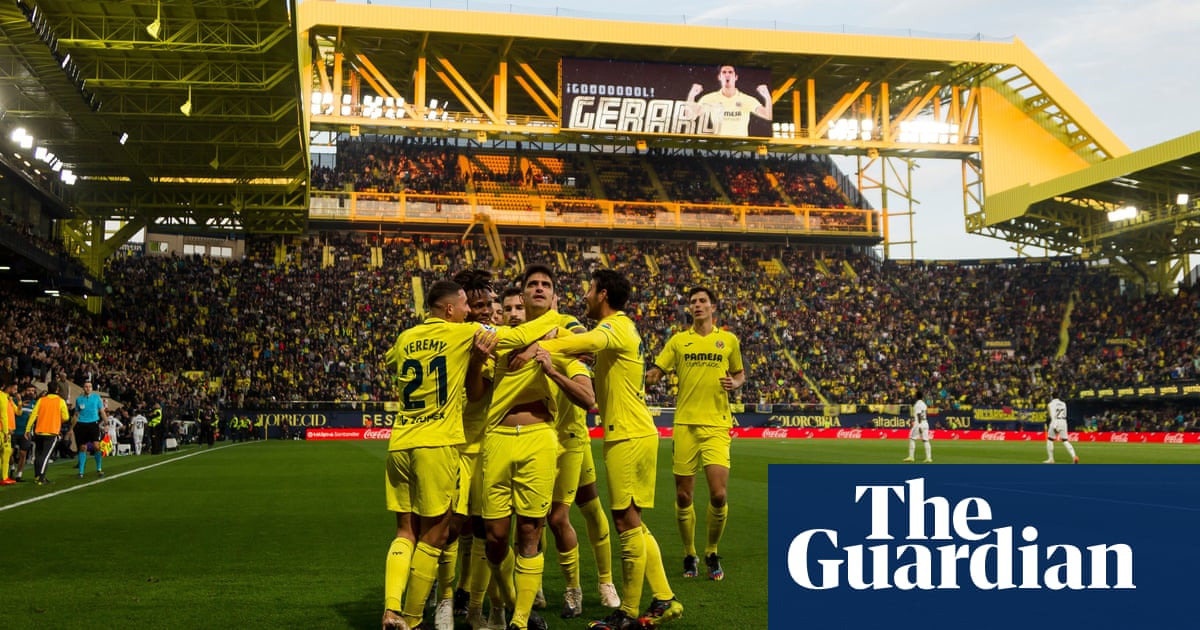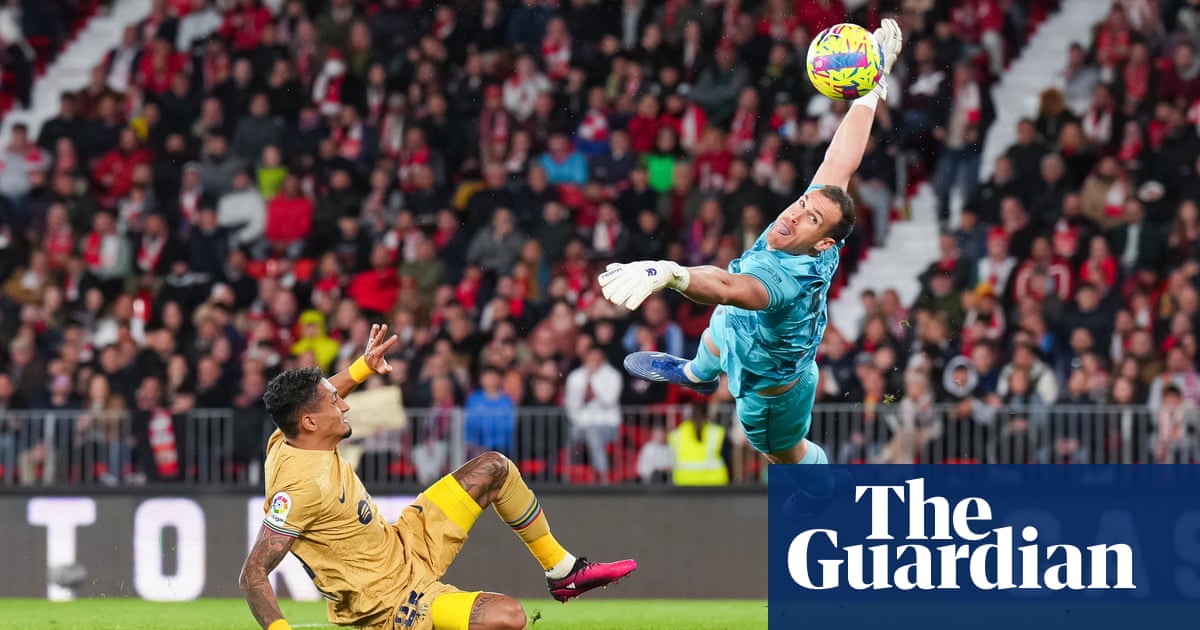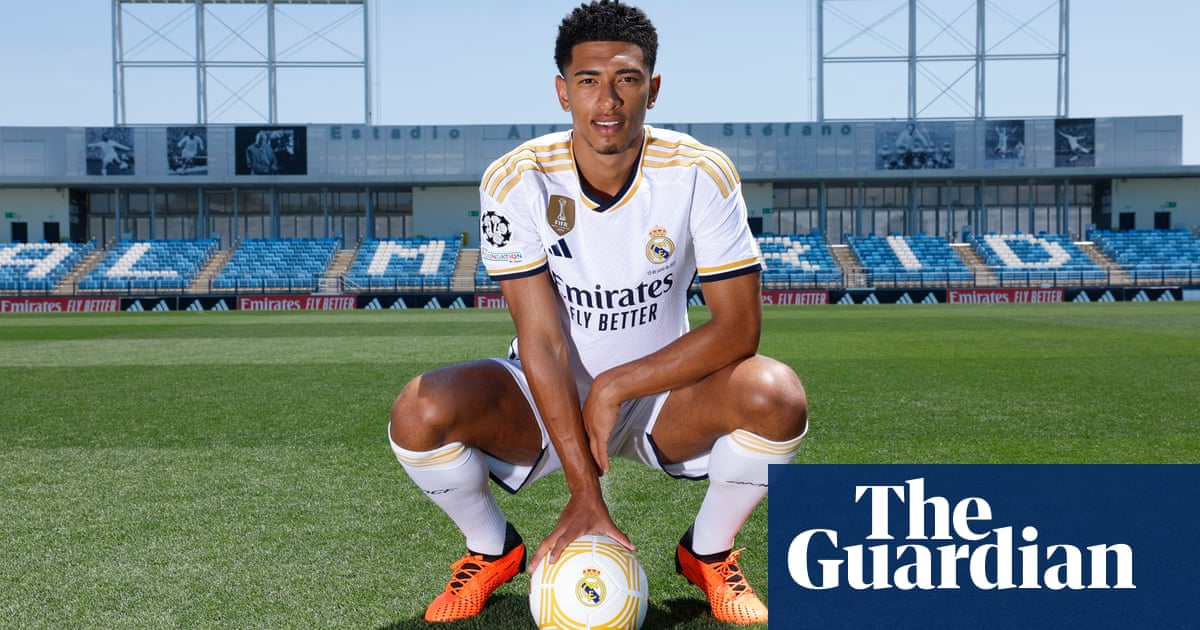
Quique Setién started the season at Real Oviedo, where the football ground is overlooked by a 30-metre Jesus Christ. He hadn’t come to coach and had no intention of going anywhere else to do so either. Everyone knows there are cows in his tiny hometown of Liencres, human population 3,537; what fewer know is that there is a club there too and as far as the former Barcelona boss was concerned, Marina Sport Under-19s were his team now, the only place he wanted to be. The professional game was best left to other people, one man in particular, so he had come along the north coast to watch one of the few sides that inspired him and support a friend.
It was August, the opening weekend. Eder Sarabia was making his “professional” debut aged 41 and 18 months into his own career. Until then, the son of Setién’s former teammate Manu Sarabia, 22 years younger than the head coach, had been Setién’s assistant at Las Palmas, Betis and Barcelona. Now, with the senior man stopping, he had set out alone at Andorra, who he brought up from the theoretically amateur, 40-team third tier for the first time. Almost a father figure, Setién followed his progress proudly. That day, he sat high in the west stand as Andorra began life in segunda with a 1-0 win. Some will call it luck, he said later, but he knew better.
This Saturday, five months on, Andorra played Oviedo again as the second leg of the season started. They won again, 3-1, to move to three points off the playoffs to primera, but this time Setién wasn’t watching. He had better things to do, things neither he nor anyone else imagined: he was busy beating Real Madrid.
At 4.15pm, exactly the same time as Sarabia’s side started their game, 450km south, his own team were kicking off at the Estadio de la Ceramica against the first Madrid XI ever to have no Spaniards in it, 4,436 games later. By 6.15pm, Villarreal had won 2-1, goals from Yéremi Pino and Gerard Moreno momentarily lifting them level with Atlético Madrid in fourth.
It wasn’t just the result, it was how it had happened. All of it. Setién had calls but most of the time he didn’t pick up the phone and would have preferred them not to either. He had changed his number. Barcelona had been his dream but it had not gone the way he would have liked. He had read about his sacking when the statement came out and for months hadn’t been paid off, while his staff were officially kept on as employees. He had not been himself, he said, and wondered if this was a world for him any more. He didn’t like football … except he loves football. He started helping out at Marina Sport, which was the way he liked it. Sarabia apart, he wasn’t watching much and had no plans to go back.
Then Villarreal called. It couldn’t have been better, and not just because this was the club where Sarabia had started out, coaching in the youth system. This wasn’t taking on a failing club, which tends to be the way when an opportunity opens mid-season, but a successful one. Unai Emery had left for Aston Villa, which left them “screwed”, the president said, but that wasn’t entirely true. They were in a hurry, though.
Setién’s new assistant was 44-year-old former beach football superstar Ramiro Amarelle, who had played 11-a-side at youth level with Deportivo de la Coruña and who had worked there and at Racing. They joined a well-structured club and inherited a good team with a deep, talented squad. But Setién had done almost nothing in two years and wanted to do quite a lot quite fast, shifting the style. Committed to a very particular approach, possession at the heart of everything, his arrival was a “shock”, he admitted. They didn’t win for four games. They have won six in a row now.
That probably sounds better than it really is. It includes Santa Amalia, Guijuelo and Cartagena in the cup, while league wins over Espanyol and Valencia respectively came via an own goal and an 89th-minute header. Setién insisted that in all probability there will be bad runs ahead and it’s six years now without losing at home to Madrid. But, still: it’s a start. Villarreal have gone from ninth when Emery departed to sixth, a single point from Betis in fourth. The World Cup break may well have been good for them, giving time to work on a new approach. And this suggested some of the changes – Dani Parejo alone in the middle, Álex Baena deeper, Moreno central – are working, that Setién’s ideas, to which there appeared to be some reticence, can take root. He has the players.
This was a hugely enjoyable match marked by two penalties three minutes apart, just about everyone from both teams agreeing that they shouldn’t be … but as it was one each, the fallout wasn’t that fierce. A game in which Villarreal’s other goal went in off Ferland Mendy, after Thibaut Courtois had got a hand to Pino’s shot, and Antonio Rüdiger was caught out too often. One in which 40-year-old Pepe Reina – 22 years on from his debut – had to make a couple of vital saves, 37-year-old Raúl Albiol was absolutely superb and Vinícius Júnior shot just over with two minutes left.
By then Villarreal were tiring, but there was still time for Courtois to save from Samuel Chukwueze and, with the goalkeeper up for a corner and Villarreal breaking clear, for Arnaut Danjuma to roll a 50-yard shot wide of an open goal, still barely able to believe it as the final whistle went, the win secure. Villarreal had more of the ball, more shots, more chances, the football precise, brave, and intense. A Francis Coquelin backheel against the post might have been the goal of the season. And Moreno was exceptional. “We wanted to face a great team to find out our level,” Albiol said. The answer was: high.
“In many phases we were better than them: the mister wants us to press high, have the initiative, and we’re very clear what to do,” Parejo insisted. “They played better, they deserved to beat us,” Carlo Ancelotti admitted. “We produced an extraordinary game against an extraordinary opponent,” Setién said. Up the east coast, across the border, and into the Pyrenees, his former assistant had headed into his office after another victory and was checking the scores from the first division. “Setién, I’m almost as happy for you as I am for our little Andorra,” Eder Sarabia tweeted.
At their former club everyone was happy too, even if some externalised it more than others. Villarreal’s victory allowed Barcelona to climb three points clear the following night, the Metropolitano going all Gatlinburg in mid-July, Ferran Torres and Stefan Savic all headlocks, hair pulls and testicle grabs as they were sent off for wrestling in the mud, the argument continuing as they went up the tunnel, pausing only momentarily when someone headed up behind them and told them to hang on, there was a VAR check. Atlético had 20 shots – more than any game this season – with Marcos Llorente hitting the side-netting, his shot coming off Ronald Araújo, and José María Giménez and Reinildo Mandava (curiously calamitous all night) missing headers. In the last minute, Antoine Griezmann had one cleared off the line. That was Araújo too – and he was immense.
In the end, an early goal from Ousmane Dembélé, very neatly made by Pedri and Gavi, was enough. For Atlético, 60 or 70 minutes in which they were the better side were not: the opening 20, 25, when they had waited for Barcelona rather than gone looking for them, had cost them the match. “Our final 70 minutes were Barcelona’s first 20,” Diego Simeone said. “If you had said to me before the game that we would struggle for the first 20 and not find a way out and then have 70 very good minutes, I would have bought that. But sadly the goal didn’t appear.”
That, at least, was one reading – which is not to say it’s the one that everyone shared. “I see some things very, very clearly, so it’s useful,” Simeone insisted, but others still can’t work out what’s happening to them. “I feel like we did everything but win,” Jan Oblak said, sounding like a broken man. “I don’t know why we started like that, if it’s fear, a lack of confidence or what, because it’s not the first time. If I did, it wouldn’t happen.”
This, was a “fist on the desk” Xavi said, the most Cholista and least Xavian of victories, which although they were fortunate too may not be a bad thing, a sign that there’s something else there now. He had insisted that Barcelona controlled games and their problem was in the two areas, which was debatable anyway, but this time he admitted: “It was the opposite.” Instead they had held on, just.
“We suffered, we have to tell the truth,” he conceded, but while he agreed that they had not played brilliantly after that opening spell, there was a satisfaction in defending, resisting “as a family”. Asked why there wasn’t more euphoria, the Barcelona coach replied: “Maybe I don’t show it, but I’m happy on the inside.”












